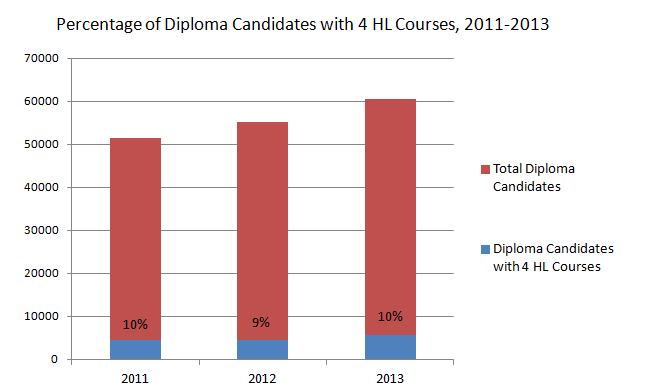Taking Four higher level courses in the IB has always appeared to be a challenge for only the brightest and hardest-working of us, but new light on the subject casts doubt on the idea that taking four HL courses actually helps students. To put this in context, around 10% of IB Diploma candidates elect to take four HL courses, and this figure has stayed the same since at least 2011. For May of 2013, just over 5,400 students registered for the IB Diploma with 4 HL courses and the pass rate of the all IB students actually went down from previous years (84%) to just over 80%, according to the IB Diploma Statistical Bulletin.
That means the total IB Diplomas awarded with 4 HL courses was just over 4,300. The universities these candidates were accepted into are interesting and equally enlightening:
- Number of final transcripts sent to the University of California campuses – 1,788
- Number of final transcripts sent to the Ivies – 1,167
- Number of final transcripts sent to the Oxford, Cambridge, LSE – 417
- Number of final transcripts sent to the McGill, UBC, University of Toronto – 4,616
All these universities can be recognized as top choices for outstanding students worldwide and the IB is well represented at these different institutions. These numbers show that almost 8,000 IB students matriculated at these top universities – twice as many as the number of IB students taking 4 HL courses.
Therefore, even if we assume that every single student who obtained an IB Diploma with 4 HL courses achieved high enough scores to be competitive, and actually matriculated at a top university, students who have the ‘recommended’ 3 IB HL courses matriculated at prestigious universities in at least equal numbers.
Though we often give praise and admiration to those brave enough to take on four highers, we should first stop and ask ourselves about the value of doing so. Clearly, students who take three highers do just as well, so why do more work? It may sound cliché but the phrase “work smart, not hard” should be the guide to all students taking the grueling and exhausting IB.
To quote the IB on what its desired outcomes are: “The IB is more than a set of exams. It asks students to inquire, to reflect, to take risks, to communicate effectively. It expects them to learn how to research and write academic papers. It requires them to move beyond their classroom experience into the community and to reflect upon this experience in CAS. The IB is not about accumulating a bunch of scores. The IB is about becoming a critical thinker who has the skills and knowledge to be a lifelong learner, and work well beyond cultural and linguistic barriers” (IB HandBook) If we take a step back, I don’t think many of us would conclude that a fourth higher helps to achieve this outcome.
By Julian Klingen

































































